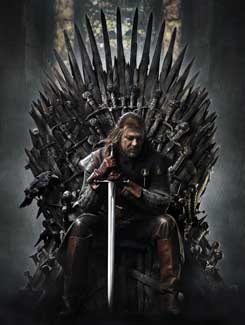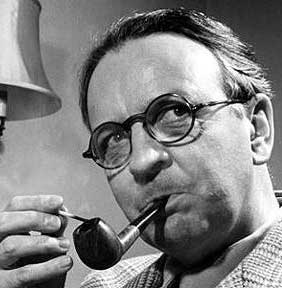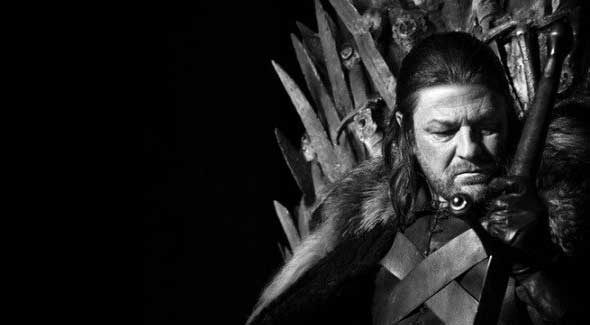
They even make it LOOK noir in that poster. Imagine Bogie sitting on that thing.
Spoilers for the HBO adaptation of Game of Thrones.
Two hit TV series debuted this spring: The Killing and Game of Thrones. Interestingly, they were both murder mysteries.
You may not think of HBO’s fantasy epic as a gritty noir. The highlights for most people are the dynastic maneuvering, the rich mythology, the lush production values, and the steamy sex, not necessarily in that order. There’s a ton of plotlines, but Ned is the main character of Season 1. And Ned spends the season in full-out private detective mode. He doesn’t have the trenchcoat, but he does have the stubble.
The events of Game of Thrones are kicked off by the suspicious death of Jon Arryn, the Hand of the King. King Robert wants his old friend Ned to take on the job. At first he’s reluctant. Then, his wife’s sister reveals that she thinks Jon Arryn was murdered. Ned agrees to become the new Hand, largely because he wants to find out the truth and protect his friend. In other words, he puts on the deerstalker and takes the case.
But the show isn’t merely a detective story. It’s a noir detective story, meaning that it takes place in a world of duplicity and corruption. Probably the all-time master of noir is Raymond Chandler, whose protagonist Philip Marlowe worked the streets of Golden Age Los Angeles. In December 1944, Chandler wrote an essay for The Atlantic called “The Simple Art of Murder,” which sketches out his personal formula for detective novels. It’s striking how much Chandler’s world has in common with George R. R. Martin’s.
The realist in murder writes of a world in which gangsters can rule nations and almost rule cities, in which hotels and apartment houses and celebrated restaurants are owned by men who made their money out of brothels, in which a screen star can be the fingerman for a mob, and the nice man down the hall is a boss of the numbers racket; a world where a judge with a cellar full of bootleg liquor can send a man to jail for having a pint in his pocket, where the mayor of your town may have condoned murder as an instrument of moneymaking, where no man can walk down a dark street in safety because law and order are things we talk about but refrain from practising; a world where you may witness a hold-up in broad daylight and see who did it, but you will fade quickly back into the crowd rather than tell anyone, because the hold-up men may have friends with long guns, or the police may not like your testimony, and in any case the shyster for the defense will be allowed to abuse and vilify you in open court, before a jury of selected morons, without any but the most perfunctory interference from a political judge.

Raymond Chandler, badass.
Game of Thrones shares another similarity to Chandler’s work. Chandler always made his protagonist the one decent human being in a wicked and fallen world. He called Marlowe his “white knight in a trench coat.” (This isn’t a universal noir trope, by the way — Dashiell Hammett’s Sam Spade is having an affair with his own partner’s wife.) Here’s more from “The Simple Art of Murder”:
But down these mean streets a man must go who is not himself mean, who is neither tarnished nor afraid. The detective in this kind of story must be such a man. He is the hero, he is everything. He must be a complete man and a common man and yet an unusual man. He must be, to use a rather weathered phrase, a man of honor, by instinct, by inevitability, without thought of it, and certainly without saying it. He must be the best man in his world and a good enough man for any world.
I think we can agree that if Ned Stark is one thing, he’s a man of honor, and the best man in King’s Landing. “Best” in the sense that Chandler meant, at least.
But of course, Game of Thrones isn’t exactly like a Raymond Chandler book. For starters, none of the Philip Marlowe novels end with the detective’s head being mounted on a pike. I think the difference is that in Raymond Chandler’s world, the truth still matters. Law and order may be a little wobbly, but at the end of the day, the police are going to prosecute murder. Everything Marlowe does is predicated on the assumption that when he discovers the truth, someone is going to give a damn.

To paraphrase one of my favorite noirs: "Forget it Ned, it's King's Landing."
That’s the illusion Ned Stark is laboring under as well. To me, the pivotal moment of the first season is when he’s transcribing King Robert’s will, and instead of writing that Joffrey should inherit the throne, he writes “my rightful heir.” Since Ned has learned that Joffrey isn’t his rightful heir, he thinks this is going to foil the Lannisters’ whole scheme. Ned presents the will in the throne room, in front of dozens of people. Cersei responds by tearing it up. Ned tries to have her arrested, and the Lannisters unleash a full-scale slaughter of everyone remotely associated with the Starks, including Sansa’s nurse.
As it turns out, it doesn’t matter who killed Jon Arryn, or whether Joffrey is the rightful heir. All that matters is who’s sitting on the throne. As Littlefinger tells Ned, the guards will obey whoever pays them. This is a Machiavellian world, in which power means never having to say you’re sorry. Tyrrion Lannister is accused of something he (probably) didn’t do, and his trial consists of a couple designated champions fighting to the death. That’s a perfect metaphor for the whole Realm: muscle takes the place of justice. Lady Stark doesn’t learn the truth about what happened to her son until she hits Jaime in the side of the head with a rock.
A private detective would be very useful in this world—there’s certainly a lot of secrets to uncover. But a White Knight doesn’t stand a chance.
SPOILER POLICY: Because it’s Game of Thrones Week on Overthinking It, we are posting a specific spoiler policy on each article. This article deals with the events of Season 1 of the HBO series — please limit any spoilers in the comments to that.

One of the reasons I have loved the Fire and Ice Saga is that it does operate in a universe I consider more “realistic” than other fantasy universes. I got so tired of the same old hero-underworld-spritual catharsis-kills the dragon and gets the princess-story. Not that the dungeon-journey and it’s structural kindred don’t make good stories — they do. But I wanted complicated characters, characters that could trade sides and switch allegiances, aside from that one cowardly stool pigeon, and a political world a little more interesting than hidden-prince-inherits-his-perfect-kingdom-through-might-and-virtue-story.
I loved Game of Thrones and I was shocked when **spoilers for people who haven’t read the books** not only was Lady, Sansa’s wolf, killed, but Ned Stark was executed at the end. I was all set for a really awesome reveal, but Martin inverted that detective noir expectation and plowed the secret back into the plot. Awesome!
You get lots of satisfaction from yelling at Ned, too. “Listen to Renly! Now is the time to act!” I love it. People’s actions have actual plot-moving consequences, such as Danaerys’ willingness to sacrifice her unborn son for the zombie horse lord. It’s so sad, so human, and it adds to the depth of her character. She’s the one acting out the hero journey, but she’s not a big strong man, and she’s motivated by personal satisfaction, revenge, ambition, and a quest for liberation. It’s awe-inspiring. She makes mistakes, costly ones, and learns from them.
That said, I think both Sansa and Arya are underused. They’re so young, all of the stark kids are so young, that they’re really wonderful opportunities for character development, and I don’t get what Martin is doing with them, especially in Feast for Crows.
I think that Tyrion Lannister and Jon Snow are my favorite characters who change sides. Jon Snow is one of the few characters who get to explore the true potential in their character development. Tyrion always has multiple loyalties and motivations, and in my mind, remains one of the most honorable characters and the most morally consistent. He’s clever, he’ll cheat, but he consistently treats people with respect and he protects children when he has the power to do so.
Anyway, I haven’t been able to watch all of the TV episodes due to not owning a TV, but I thought the relationship between Arya and Yorick was very well-portrayed, and I’m looking forward to the series exploring her reaction to the tough stuff she has to go through.
[Ed. Note: This comment was posted before the spoiler policy above was added to the article. It contains information not in the first book or the first season of the HBO show.]
I’m not sure where Arya’s story is going yet either, but I’m enjoying the hell out of her mad, bizarre odyssey. As for Sansa, ***SPOILER HERE*** what I’m HOPING is that (in between being creepy) Baelish teaches her about maneuvering and manipulation, giving her the tools to survive in the noir world of Westeros. I’m hoping she has hidden depths, and he brings out the intelligence that she has buried under her role as a marriageable bargaining chip. That would be some character-development and payoff that would be worth everything that we’ve had to endure with her so far (both the terrible things that have happened TO her and the whining we’ve had to put up with FROM her).
I’m a couple hundred pages deep into the third novel, I picked them up about 6 episodes into the series. Without spoiling anything, the reason I find the characters of Westeros so engrossing is that the antagonists read like real people.
They have values, all of them, they aren’t just evil caricatures (aka noseless Voldemort), they make mistakes, they waiver from one extreme to another, most are realists, most recognize true evil (the Others, the Mad King), but they’re all still bastards (aka assholes, not baseborn!) in their own way.
The only exception to this seems to be King Joffrey, which is fine as a plot device as it allows all other antagonists in Kings Landing an extreme to identify and take actions against.